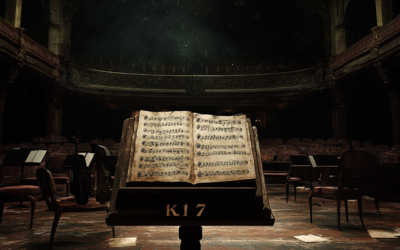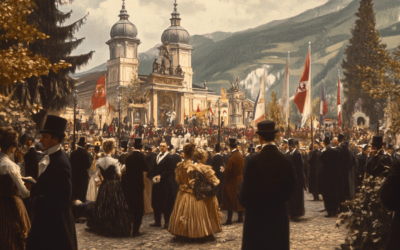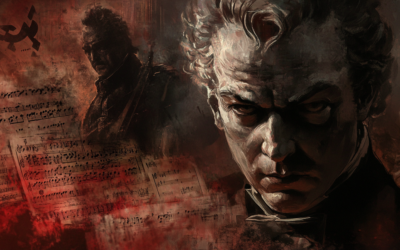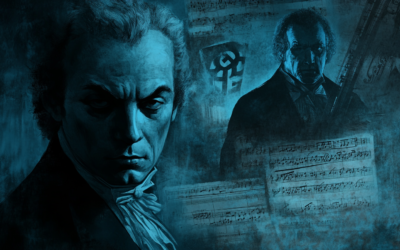A Questionable Canon
The Misattribution of Mozart’s K.2 89a (K.6 73i)
K.2 89a (K.6 73i) is no grand work of genius, but rather a simple canon exercise for four sopranos. Its problems range from missing voices and unresolved harmonies to a lack of text, suggesting it’s a poorly copied version of an earlier work.
Modern editors have tried to patch it up, but can we really still call this a work by Mozart? It’s time to question whether it belongs in his catalogue at all.
Mozart: The Fall of the Gods
This book compiles the results of our studies on 18th-century music and Mozart, who has been revered for over two centuries as a deity. We dismantle the baseless cult of Mozart and strip away the clichés that falsely present him as a natural genius, revealing the contradictions in conventional biographies. In this work, divided into two parts, we identify and critically analyze several contradictory points in the vast Mozart bibliography. Each of the nearly 2,000 citations is meticulously sourced, allowing readers to verify the findings. This critical biography of Mozart emerges from these premises, addressing the numerous doubts raised by researchers.
"A copy with missing voices and incomplete harmonies—Mozart would have known better."
Mozart: The Fall of the Gods
K.2 89a (K.6 73i), attributed to Wolfgang Amadeus Mozart, is a simple canon exercise in A major for four sopranos in unison. This piece closely resembles the Kyrie K.89, which is also written for four sopranos in unison. However, unlike the Kyrie, which serves a clear liturgical purpose, K.2 89a (K.6 73i) seems more like an incomplete experiment.
In this supposed composition, Mozart wrote only six measures for four voices. The piece is stagnant, with no modulations as it remains firmly in A major throughout. There is an overwhelming amount of repetition, suggesting a lack of imagination, even if one were to excuse it as a contrappuntal exercise.
This is where things become problematic. Although Wolfgang arranged the piece for four voices, the canon actually requires five to achieve complete harmonies. Without a fifth voice, the piece sounds incomplete, leaving discordant gaps that Mozart, if he had composed it, would surely have recognized.
The fifth voice is not indicated in the original manuscript, yet modern editors, including the Neue Mozart-Ausgabe (NMA), have added it in parentheses. This fifth voice logically enters at measure 13, filling the incomplete harmonies that otherwise sound weak. Curiously, Mozart left the final three measures filled with pauses, which suggests he may not have fully solved the harmonic puzzle presented by the canon.
Moreover, Amadé didn’t bother writing out any text, leaving many notes in a disjointed state, as though he were copying from an original source that had syllables of text he ignored. In an attempt to fill this void, modern editions have introduced whimsical verses, such as:
“Hei, wenn die Gläser klingen, so lasst uns alle fröhlich sein, und lasst uns lustig singen, ja singen ja lustig singen, am Tisch beim kühlen Wein.”
(“Hey, when the glasses clink, let’s all be merry and sing happily, sing sing joyfully, at the table with cool wine.”)
Breitkopf’s edition, unlike the NMA, corrected the canon by discreetly adding the fifth voice without explicitly saying so, transforming the piece into a Kanon für 5 Stimmen (canon for five voices) to make it more marketable.
Given that this is clearly a poorly resolved copy of a canon by an anonymous author, with Mozart forgetting the fifth soprano’s entrance, it should neither be considered an original composition nor included in his official catalogue.
You May Also Like
Constanze Mozart’s Enduring Love
Although some have doubted her devotion, Constanze’s own words and actions illustrate a widow deeply committed to preserving Mozart’s legacy. Diaries, personal correspondence, and eyewitness testimony all challenge the notion that she neglected his memory—while the circumstances around his burial grow ever more perplexing.
A Revealing New Interview on His Thematic Catalogue
We’re excited to present a brand-new interview that challenges many of the long-held assumptions about Mozart’s Thematic Catalogue (1784–1791). Conducted by Swedish journalist Henry Grynnsten, this conversation delves into groundbreaking forensic techniques—like advanced ink analysis and digital image processing—that may change the way we view Mozart’s late works.
The Rattling Symphony: A Critical Take on K. 17
Often attributed to Mozart, the K. 17 symphony is anything but refined. Lacking orchestration and filled with gaps, it raises more questions than answers about its true authorship.
The Hidden Origins of the Salzburg Festival: A Nationalist Dream
The Salzburg Festival, far from being a mere celebration of Mozart’s genius, was born out of nationalist ambitions during a turbulent period in Austro-German history. Conceived by figures like Max Reinhardt, Heinrich Damisch, and Friedrich Gehmacher, the festival was deeply rooted in ultranationalistic ideals, transforming Mozart’s legacy into a tool for cultural dominance. The truth behind its founding has long been obscured, but the primary sources tell a different, darker story.
Mozart, Wagner, and the Nazi Myth
The Führer’s admiration for Wagner’s racially charged ideology not only influenced the policies of the Nazi regime but also reshaped the legacy of Mozart. Under National Socialism, Mozart was not celebrated as a universal genius but as a symbol of German purity and superiority. His music, stripped of its international influence, was rebranded as an expression of Aryan identity, intended to unify and inspire the German people.
Mozart, the Anschluss, and Nazi Propaganda
Following the 1938 Anschluss, the Nazi regime rebranded Mozart as the quintessential German composer, using his image to promote unity between Austria and Germany. The Salzburg Festival became a platform for Nazi propaganda, distorting Mozart’s legacy to fit their nationalistic and racial agenda.







